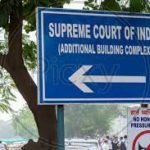This judgment addresses a crucial environmental challenge concerning regulatory dilutions and the principle of sustainable development. The petition challenged a notification dated 29th January, 2025 (S.O. 523(E)) issued by the Ministry of Environment, Forest and Climate Change (MoEF&CC) and an Office Memorandum dated 30th January, 2025, also issued by the MoEF&CC.
Background:
The petitioner argued that the 2025 notification “totally changes the regime” established by the earlier notification dated 14th September, 2006 (the ‘2006 notification’).
The petitioner contended that the impugned 2025 notification, particularly Note 1 to Entry 8(a) of its Schedule, effectively exempted large industrial and educational buildings from environmental impact assessment, thereby attempting to nullify previous judgments.
The respondent argued that “General Conditions” were never applicable to projects/activities under Entry 8 of the Schedule from the inception of the 2006 notification. They also submitted that the MoEF&CC is not equipped to consider all projects nationwide, justifying the role of State Environmental Impact Assessment Authorities (SEIAA), and that a stay would cause irreparable damage to developmental activities.
Law Involved
Impugned Instruments: MoEF&CC Notification S.O. 523(E) dated 29th January, 2025, and Office Memorandum dated 30th January, 2025.
Prior Environmental Clearance Regime: MoEF&CC Notification dated 14th September, 2006 (‘2006 notification’).
Specific Schedule Entries: Entry 8(a) (Building and Construction projects) and 8(b) (Townships and Area Development projects) of the Schedule.
Governing Environmental Legislation: Environment (Protection) Act, 1986, Wild Life (Protection) Act, 1972, Water (Prevention and Control of Pollution) Act, 1974, and Air (Prevention and Control of Pollution) Act, 1981.
Core Environmental Principle: The Principle of Sustainable Development, which involves balancing environmental protection with developmental needs, was a central tenet. Related principles include the Precautionary Principle and the Polluter Pays Principle .
Key Judicial Precedents: The Court referenced its established jurisprudence on sustainable development, including cases like Vellore Citizens’ Welfare Forum v. Union of India and Others and In Re: Construction of Park at Noida near Okhla Bird Sanctuary.
Reasoning
Interpretation of 2006 Notification: The Court applied the literal rule of interpretation, noting that the 2006 notification did not explicitly state that “General Conditions” applied to projects under Entry 8(a) and 8(b) . It observed that wherever General Conditions were intended to apply, it was clearly specified in Column 5 for other project categories.
Impact of Note 1 to Entry 8(a) in 2025 Notification: The Court found that Note 1 to Entry 8(a) in the 2025 notification explicitly stated that “General Conditions” shall not apply. The Court reasoned that allowing this note would exempt “industrial shed, school, college and hostel for educational institution” from environmental scrutiny, which would undermine the purpose of the Environment Protection Act .
Unjustifiable Exemptions: The Court emphasized that a construction activity for an area exceeding 20,000 sq. m. inherently causes an environmental impact . It further reasoned that “education is no more exclusively a service oriented activity” but a “flourishing and thriving industry,” and there was no rational basis to exempt large-scale industrial or educational buildings from environmental regulations .
Sustainable Development Imperative: The Court reiterated that while development is necessary for a country’s progress, it must be pursued in a manner that causes the least damage to the environment and ecology, incorporating mitigation or compensatory measures for any unavoidable harm . This aligns with the “balancing concept” of sustainable development.
Role of SEIAA: The Court acknowledged the respondent’s submission that SEIAAs are expert bodies constituted by the Central Government to consider proposals pertinent to States/Union Territories, as the MoEF&CC is not equipped to handle all projects .
Holding
The Writ Petition was partly allowed.
Exempt to large-scale industrial or educational buildings from environmental regulations set aside.
The Office Memorandum dated 30th January, 2025, issued by the MoEF&CC was upheld.
VANASHAKTI V UNION OF INDIA
Supreme Court: 2025 INSC 961(DoJ 05-08-2025)






